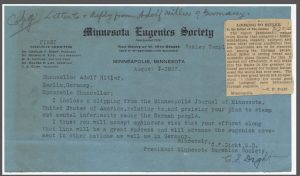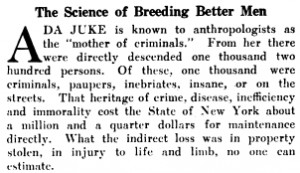Many people believe the Nazis were entirely different animals than the rest of humanity, but the truth is that they had many ideological ‘friends’ elsewhere, and no, not in the circles of white supremacy. Rather, they were doctors and scientists and other professionals of good standing, well regarded in America at the time. CF Dight …
Category: eugenics as a science
“Eugenics: Its Definition, Scope, and Aims” by Francis Galton
One of the earliest, more definitive beginnings of the Eugenics movement, was this address given by Francis Galton. Eugenics got its bad rap by its association with the Nazis. Its important to observe that its most ardent proponents were Americans. “Eugenics: Its Definition, Scope, and Aims” by Francis Galton. Read before the Sociological Society at a …
Scientific American: “The Science of Breeding Better Men” 1911
Editorial from a 1911 edition of Scientific American [Source]: Sci-Am’s Editor’s note: This editorial was written and published in 1911. Although our editors of a century ago pondered some lofty aspirations for the orderly future of humans, it was only three decades later that the brutal reality of a Nazi social order suffused with a …
Defective Genes are Like Pathogenic bacteria and viruses the Law Must Control
As quoted in The New Diagnostics by Dorothy Nelkin and Laurence Tancredi, 1989 (pg 13-14) Although the old eugenic generalizations have been cast off, the logic behind them persists, refueled from diagnostic tests and justified in terms of efficiency, effectiveness, and cost. Thus some geneticists suggest the social importance of improving the “gene pool.” For …
Charity a Hindrance to Natural Selection
In the following foreword from a compilation of 12 eugenic lectures (1914), we see that eugenics is perceived as merely applied evolution. Furthermore, ‘modern man,’ being a sympathetic being, keeps alive those that should die. With luck, principles of breeding already used with animals will be brought to bear on humans. ——————- Foreword by Lewellys …
The Geneticists Manifesto (1939) or Social Biology and Population Improvement, by H.J. Muller
Social Biology and Population Improvement (aka, the Geneticist’s Manifesto) by H.J. Muller [Source #1, Source #2] The Seventh International Congress of Genetics adjourned at Edinburgh only three days before World War II got under way. It is interesting to recall that just before the shooting started a group of geneticists at that Congress-informally formulated what …
Francis Galton Coins the Word ‘Eugenics’ as the Science of Better Breeding: Men, Brutes, and Plants. Quote of the Day
A little known fact is that eugenics was seen as the application of principles of heredity, in particular those principles as understood by Darwin. In this excerpt, Francis Galton (Darwin’s cousin), coins the word eugenics and explicitly refers to it as a science. The principles of heredity thus applied, he says, are “applicable to men, …
Eugenics and Christianity in a Letter to the Eugenics Review
Norman A. Thompson, “Eugenics and Christianity”, published in The Eugenics Review, pages 346-347 (1933) [Source] To the Editor, Eugenics Review Sir, In these latter days of the general liquefaction of ideas, philosophies, and policies, whether founded on dogma or tradition, or on other bases, which may have satisfied our understanding at earlier stages of the …
Frederick Osborn, Galton and Mid-Century Eugenics, 1956 Eugenics Review published lecture and “Voluntary Unconscious Selection”
Frederick Osborn, president of the Population Council and steadfast advocate for eugenics, in a 1956 speech recorded in the Eugenics Review. [SOURCE] […] Galton never envisaged any system of arbitrary controls, except for the more serious mental and physical handicaps, which should be treated like a form of communicable disease. But he did propose that …
George William Hunter’s “Civic Biology” — the Eugenics Textbook at the Heart of the ‘Scopes Monkey Trial’
The so-called ‘Scopes Monkey Trial’ was a media sensation at the time, but how it actually went down was shamelessly skewed afterwards to make it seem that the evolutionists were humble seekers of truth and those who stood against them ignorant, religious bigots. This viewpoint was perpetuated effectively through movies on the trial such as …
- 1
- 2



Recent Comments